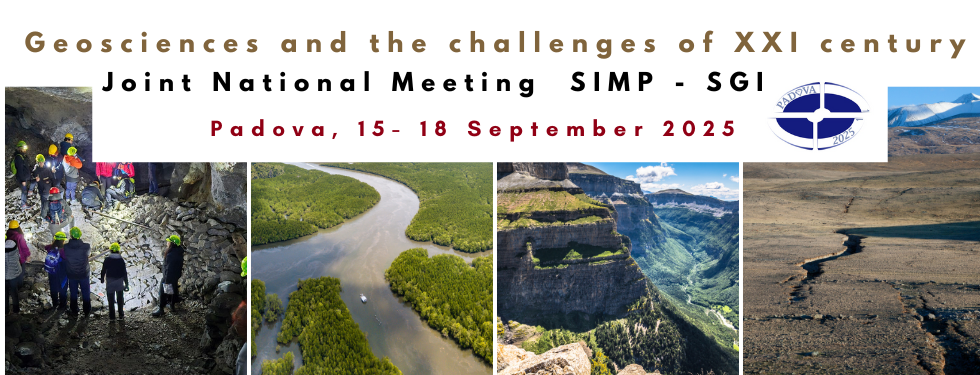Geosciences and the challenges of XXI century

From Monday 15 September, Padova will be the beating heart of Italian geosciences, hosting the Joint National Congress of the Italian Society of Mineralogy and Petrology (SIMP) and the Italian Geological Society (SGI).
The event, entitled “Geosciences and the challenges of the 21st century”, will take place at the new Padova Congress centre in Via Tommaseo in Padua and will bring together over 1,000 geologists and researchers from around the world to discuss issues that are fundamental to the future of the Earth, starting with the impact of climate change on human activities.
The convention promises to be an extraordinary event, with 1,100 new research papers presented, 38 scientific sessions and 4 plenary conferences dedicated to crucial topics such as the health of the seas and oceans, the Anthropocene, critical raw materials and the geological exploration of the solar system.
These topics will be explored in depth by Sabrina Speich, an Italian oceanographer working at the École normale supérieure in Paris who specialises in studying the impact of climate on the oceans, Jan Zalasiewicz, a British geologist and palaeontologist best known for his research into how human activity is leaving a lasting geological footprint on the planet, and Wolfgang Maier, a professor at Cardiff University and an expert in the field of economic geology.
The fourth topic, which concerns the new frontier of geosciences, will be discussed by the famous ESA astronaut Luca Parmitano. Specifically, on Monday 15 September at 6 p.m., Jan Zalasiewicz will speak on “Anthropocene: geological signs of planetary change”, on Tuesday 16 at 2.45 p.m., Sabrina Speich will talk about “Ocean and climate: thirty years of multiscale and interdisciplinary research”, on Wednesday 17 at 2.45 p.m., Luca Parmitano will discuss “Planetary explorers: from Earth to future missions to the Moon and Mars”, and finally, on Thursday 18 at 2.45 p.m., Wolfgang Maier will conclude the plenary sessions on “The social relevance of economic geology”.
The Meeting, chaired by Professors Giulio Di Toro and Davide Novella of the Department of Geosciences at the University of Padova, will address a wide range of topics, including bio-geosciences and climate, geological and cultural heritage, the evolution of Planet Earth, tectonics and geochemistry, geological cartography, geomorphology and industrial applications, natural hazards, volcanology and seismology. In particular, the presentations will focus on topics such as the formation, differentiation and evolution of the Earth's interior, with a focus on magmatic and metamorphic processes, mineral physics, crystal-chemical reactions and crystal structures, and the natural processes that drive the Earth's ongoing evolution. They will range from a comprehensive study of mountain ranges, examining their formation, characteristics and significance within the Earth's geological framework, to the dynamic interaction between climate change, the sedimentary record and the evolution of life throughout Earth's history. They will also focus on global energy demand and new sustainable exploration techniques, endogenous forces such as tectonics and volcanism, and exogenous forces related to the atmosphere, hydrosphere, cryosphere and human activities, which have created the landscapes that define our planet; on sustainability and resilience to natural hazards and risks through advanced research and technological innovations and, last but not least, the intersection between geosciences and cultural heritage, the dissemination of geosciences and the role of geosciences in heritage preservation.
The Joint National Congress of the Italian Society of Mineralogy and Petrology and the Italian Geological Society is a fundamental crossroads at a crucial moment for our planet. With a rapidly growing world population and challenges related to climate change, resource management and space exploration, geosciences are at the centre of the search for solutions for a sustainable future.
"We will present 1,100 new studies on the challenges facing our planet, from environmental risks to the opportunities of space exploration," says Paolo Mazzoleni, President of SIMP. "SIMP, with its 500 members, continues its commitment to the advancement of mineralogical and petrological sciences, with a particular focus on supporting young researchers."
"This joint conference of the two most important Italian scientific societies in the field of Earth Sciences," emphasises Rodolfo Carosi, President of the SGI, "is a historic event. The SGI, founded in 1881 and with 1,600 members, has always promoted the advancement and dissemination of geological knowledge."
This event not only represents a unique opportunity for the scientific community to share the latest discoveries, but also serves as a real laboratory for the future. Here, experts from around the world will discuss how geosciences can help answer the big questions of our time: from the sustainable management of natural resources to the mitigation of geological risks and the exploration of new worlds beyond Earth.
At a time when the world's population could reach 11 billion by 2100, with growing demand for water, food, energy and raw materials, the Congress aims to stimulate the innovation and collaboration needed to address these global challenges. The goal is to turn these challenges into opportunities by promoting an approach that allows us to live in harmony with our planet, for ourselves and for future generations.
"Geosciences originated with our genus Homo," recalls Giulio Di Toro, "because since our appearance on this planet, we have interacted with the environment to find resources for survival or materials, for example, to produce the first tools millions of years ago (Homo habilis) and, with those same materials, to produce microchips today (Homo sapiens). We could not physically write these lines without geological expertise. Geosciences are therefore not only a wonderful discipline because they aim to understand the world around us, satisfying the insatiable thirst for knowledge that has always characterised Homo sapiens, but above all a set of basic and applied knowledge that will enable us to overcome the extraordinary challenges we will face in this century. This conference will offer an updated overview of the state of knowledge in geosciences, particularly that of the Italian community, which, despite limited funding, is among the most active on the international scene".
This event therefore marks a decisive moment for Italian and international geosciences, catalysing the research and innovation needed to guide the path towards a sustainable and resilient future for our planet, on Earth and beyond.
"During the joint SIMP-SGI 2025 conference," concludes Davide Novella, "the geological community will present the state of the art in various disciplines, both fundamental – such as the study of the formation and evolution of planet Earth – and applied, such as the formation of natural deposits and the sustainable use of energy resources. In addition, the SIMP-SGI congress will highlight the central role that geosciences play in contemporary society and in addressing some of today's greatest challenges: climate change, natural hazards, raw material supply and space exploration. Experts from Italy and abroad, from academia, research centres and industry, will have the opportunity to discuss geosciences and the challenges of the 21st century, contributing not only to advancing basic knowledge in this fundamental discipline, but also to charting a perspective for the future of our planet".
On 15 September, before the official opening of the Congress, the Department of Geosciences at the University of Padua will also host Ph.D. Day, an open day for all doctoral students in Earth Sciences in Italy, which will be a very important opportunity for discussion for the new generation of researchers.







